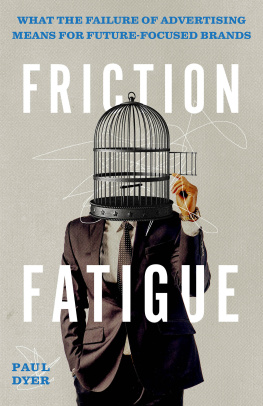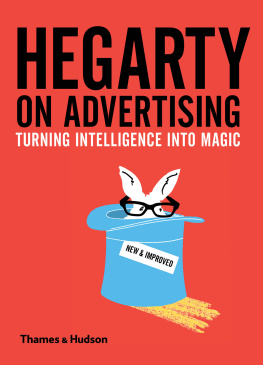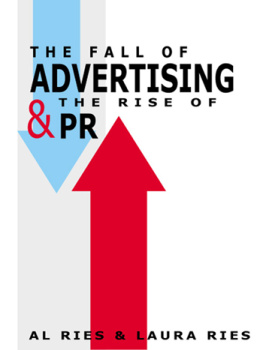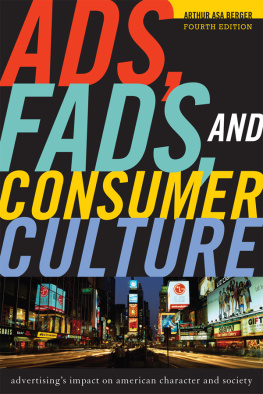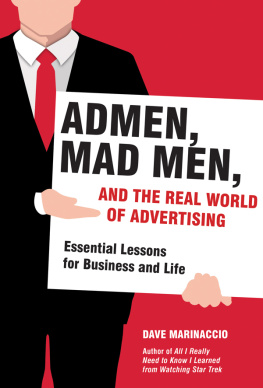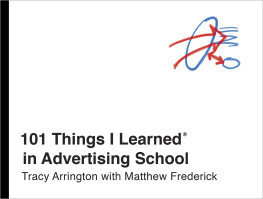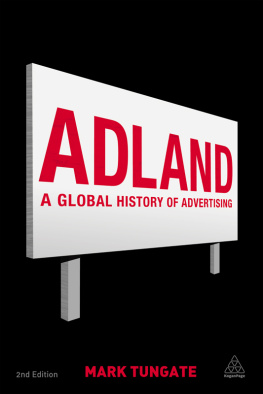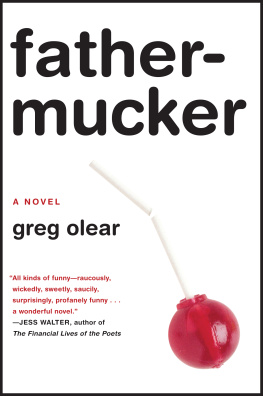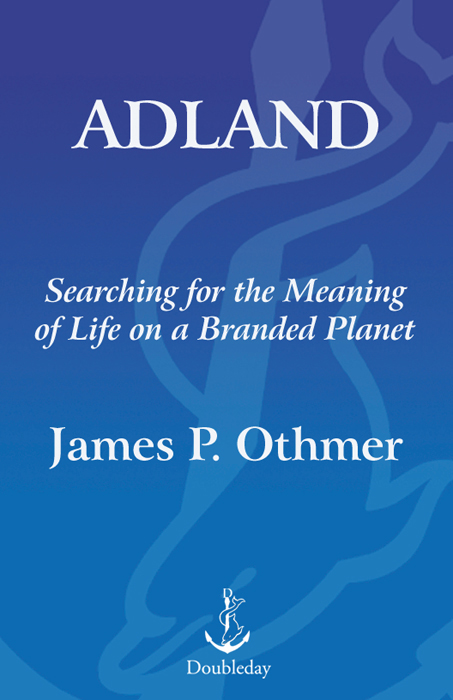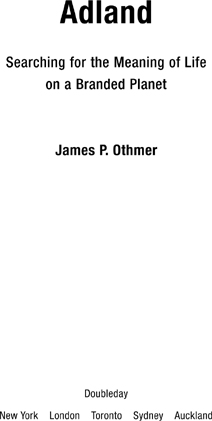For Judy, Isabel, and Jamie
Where you come from is gone, where you thought you were going to never was there, and where you are is no good unless you can get away from it.
FLANNERY OCONNOR
If God manifested himself to us he would do so in the form of a product advertised on TV.
PHILIP K. DICK
Contents
Part 1
Part 2
Part 3
Part 1
Its Hard to See the Writing
on the Wall of a Cubicle
On Moral Advertising and
Other Corporate Oxymorons
Do you think it would be morally acceptable to work on a beer account? How about light beer? Or hard liquor? For instance, eighty-proof sweet stuff with a cool name that goes down easy, especially for those, ahem, new to drinking. Would you sell it with humor? Sell it with sex? Does alcoholism run in your family? Would you sell it to a younger, potentially underage demographic by casting older people who look young? Would you target a minority? What if it ran only on late-night cable channels?
What about tobacco? Would you make cigarette ads? Would you make cigarette ads if they had huge YOU WILL DIE IF YOU SMOKE THESE! warnings plastered across the bottom? Would you do antismoking ads paid for by big tobacco? Would you not under any circumstances do cigarette ads yet work for a company or holding company that makes hundreds of millions of dollars every year marketing cigarettes and selling them without communications restrictions to the third world? Does cancer run in your family?
Would you work on a military account? Would you if the assignment was to increase the number of eighteen-year-old recruits during an unpopular war? Does your 401(k) portfolio include any corporation or affiliate of a tobacco or defense contracting company?
Would you work on a political campaign if you believed in the candidate? Would you work on one if you didnt believe in the candidate, if, say, you are a Democrat and your boss (who you had thought was a Democrat) asks you off the record if you would like to fly to Maine to work on the campaign of a certain Republican presidential candidate? Would you play off the fears, anxieties, and prejudices of the public if it would sell your campaign and get you promoted?
Would you work on a fast-food account? Fried chicken? How about fried chicken with gobs of sodium and preservatives but no trans fats and they list the calories on the bucket and they do a separate Hey, kids, dont be a fatty! campaign and put jungle gyms and salad bars at select locations? Does obesity run in your family? Diabetes? Coronary disease?
Would you sell sugary childrens yogurt to moms as a healthy snack choice? Would you bypass the moms and go right at the kids with animated spots starring skateboarding alligators and surfing polar bears on Nickelodeon programming?
How about an oil company? Would you take a creative directors position running the account of one of the worlds biggest petrochemical companies if it meant a raise and an expense account and an office with eleven more ceiling tiles than that of your nemesis? Would you sleep better at night if your first assignment for mega-oil company was to do a global ad campaign about all the wonderful things it is doing for the environment, even if the media buy for the campaign cost more than the sum total of all the wonderful things they are doing for the environment?
Would the fact that you drive a Prius and intend to switch to compact fluorescent bulbs in less visible parts of your house make doing potentially award-winning work for the maker of an SUV that gets eleven miles per gallon easier to stomach?
How about a financial institution? Would you do ads for a bank encouraging people to refinance their homes even though you are a numbers-challenged liberal arts major with no house or savings of your own and if following your Live life to the fullest! financial credo mightactually lead families to lose their homes and, by association, cause a national lending crisis and, by further association, a worldwide economic recession?
If you worked in advertising, do you know what you would and wouldnt do, what you could live with?
Would your moral choices vary depending upon your financial situation and/or your place in the creative pantheon of your current agency, that is, do you bend a bit more if you havent sold a campaign in six months and you have a small apartment and a kid on the way and youre thisclosetobeingvested and you hear there may be yet another round of layoffs?
Do you still say, Under no circumstances will I work on the farm pesticides/herbicides/insecticides business or the campaign for the latest miracle boner pill or sleeping aid pharma with thirty seconds of mandatory side-effect copy that includes death and blindness, not to mention a questionable FDA situation?
Or do you get on your high horse and say, Fuck you! because last week you saved the $250-million-a-year Fortune 500 corporate consulting account and theres no way youre going to sell crap yogurt, beer, hard stuff, unfiltereds, troop surges, chemicals, or ideologies to anyone (this, of course, is before you happen to check out the Fortune 500 corporate consultants client list)?
Do you? Will you? Can you?
Think about it. Because your boss wants an answer in two minutes.
The Death of Darrin Stephens
LARRY TATE: You look terrible. Whats happened?
DARRIN STEPHENS: Nothing much. I just lost the Caldwell
account and my wife all in one week.
LARRY TATE: What? Thats horrible.
DARRIN STEPHENS: I know, I cant believe it.
LARRY TATE: Your wife too, huh?
Bewitched (1964)
Why a Dinosaur Has Never Won a Tony Award
Advertising as I knew it began its death rattle in the fall of 2000 in an old, dark off-off-Broadway theater on the far west side of Midtown Manhattan.
Over the years the theater had been the home to world-premiere performances of works written by the likes of Arthur Miller, Sam Shepard, Edward Albee, and August Wilson. But on this day the theaters modest stage was going to be home to a different kind of performance, a one-day-only world premiere written by a previously unpublished playwright, a nobody.
This performance would definitely contain elements of drama. And, almost certainly, tragedy. Most involved in the production, and by this time there were dozens of us, were fairly certain of this, but the degree to which it could be classified as tragedy or comedy would ultimately be decided not by the author (me) or the cast (two starving actors) or the producers (the Madison Avenue office of a global ad agency) but by the audience, which was expected to total all of five extremely impatient and not particularly happy people (our clients) absolutely predisposed to hate everything they were about to see.
We were in this venerable theater to make one last desperate pitch that promised a strategically focused, bright, shiny, globally synchronized, and brilliantly branded future to our multibillion-dollar banking client of several years who, by the way, desperately wanted to fire us.
If pressed to classify the type of production we were about to put on, I would have called it a farce.



